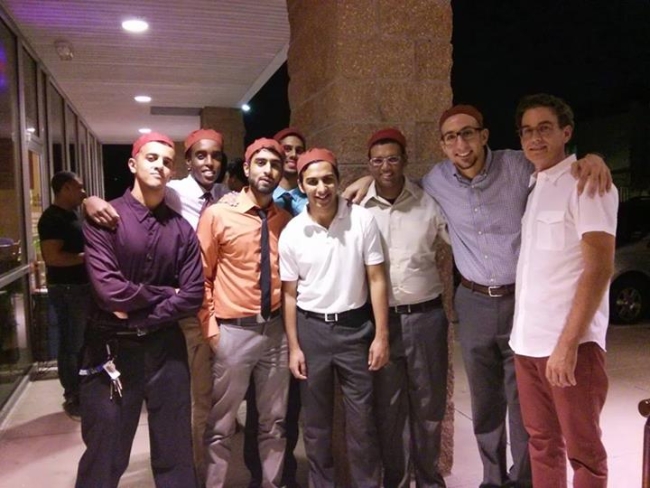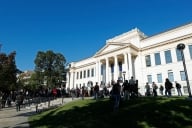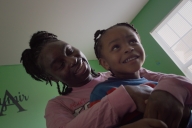You have /5 articles left.
Sign up for a free account or log in.

Brothers of the Alif Laam Meem fraternity gather with their school advisor.
Photo courtesy of Shaheer Ali
The ways in which Alpha Lambda Mu isn't your garden variety fraternity start with its name.
Interchangeably called Alif Laam Meem, after letters from the Quran, the Muslim fraternity at the University of Texas at Dallas is carving out a space in Greek life. Members abstain from drinking and partying as part of their faith, but say that's one of the few differences between ALM and any other social fraternity.
They do, however, have the added goals of clarifying the beliefs of their religion to those they come in contact with and wanting to emphasize their commitment to community service and desire to create Muslim leaders.
The men wanted a different avenue than simply telling others about the tenets of Islam through a general student organization. A fraternity, they decided, would allow them dispel any misconceptions about their religion by leading through example, member Junaid Hashami, a sophomore majoring in biomedical sciences, said. Members have attended an anti-domestic violence rally and volunteered for tornado relief efforts in Oklahoma as part of their community service.
“We just want to be a fraternity that other fraternities don’t look down on and accept us as a social organization,” Hashami said. “We have the same goals.”
Alpha Lambda Mu bills itself as the first Muslim fraternity, but Maria Ahmad, vice president-USA of the Muslim Student Association National, expects the number of Muslim fraternities to grow.
“As more generations grow up here, they’re going to get more involved in communities and campus, build relationships that are faith-based and also just be on campus having a good time,” Ahmad said.
Already, students at four other colleges, the University of Pennsylvania, Cornell University, University of Central Florida and University of California at San Diego, have expressed interest in forming chapters, another member of the UT-Dallas group, Shaheer Ali, said. The fraternity is currently in the process of becoming a recognized fraternity at Dallas, but welcomed 35 students to a rush event this past week. They’re looking for brothers who will strive for self-improvement and want to grow in their religion.
Though the fraternity has garnered attention for its focus on religion, the brothers highlight a social life of any typical college student: playing sports, grabbing a bite to eat and just hanging with one another.
“We’re honestly just a small group of college kids trying to have fun. We’re all doing the same things as everyone else and I think that’s something everyone should know,” Ali said. "We’re here to have fun and stay true to our religion.”
Many national fraternities formed have roots in specific religions or ethnicities. About a third of the 75 fraternities in the North-American Interfraternity Conference have a cultural community connection, President and CEO Peter Smithhisler said.
Some fraternities grew out of Roman Catholic, Lutheran or Jewish traditions; others have historically been made up of African American, Indian or Latino members, he said. In the spring, Delta Lambda Phi, a social fraternity for gay, bisexual and progressive men, was added into the NIC, he said.
“We really see students seeking out affinity groups and looking at groups whose values match theirs and if those groups aren’t in existence, there’s an entrepreneurial spirit: I will find my group and create it,” Smithhisler said.








